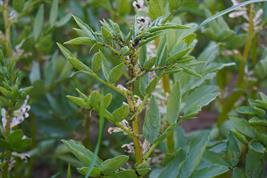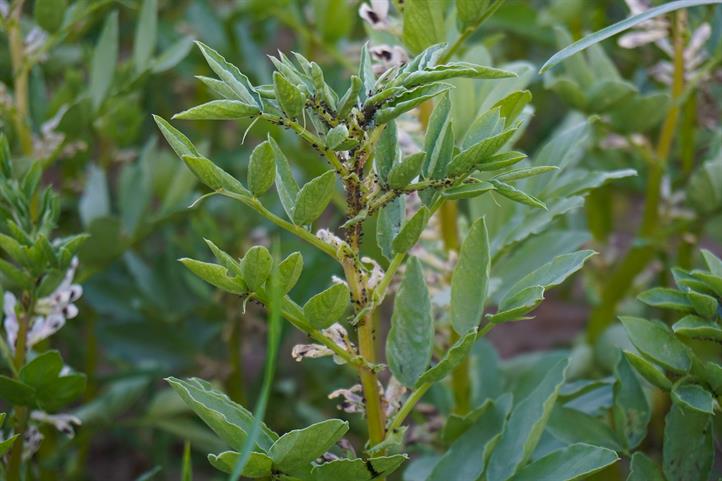16.05.2019
Press Release

Is pesticide-free agriculture possible? German and French researchers are now working together to answer this question: The Leibniz Centre for Agricultural Landscape Research (ZALF) has launched a unique Europe-wide research initiative together with the French National Institute for Agricultural Research (INRA) and the Julius Kühn Institute (JKI). Its declared aim is to substantially reduce the use of synthetic chemical crop protection products to a minimum by 2050. On 17 May 2019, leading European researchers will meet in Berlin to develop a strategy paper and roadmap, identify research gaps and activities to overcome them.
Today, synthetic, chemical-based crop protection products are used intensively in agriculture around the world in order to protect plants and crops against pests and pathogens. However, the use of these pesticides also has an impact on the environment and the climate: “Too high a dosage can lead to contamination of the groundwater and deterioration in soil fertility. In addition, more and more scientific studies indicate that the use of pesticides can negatively affect biodiversity and human health, particularly if used inappropriately and their combined effects are still not well understood”, says
Prof. Dr. Frank Ewert, Scientific Director of ZALF and co-initiator of the initiative. At the same time, pesticides protect plants from diseases and pests. Banning them overnight with no alternative would pose major problems for conventional agriculture largely relying on the extensive use of pesticides. “We still know too little about the complex interactions and interrelationships in the landscape-agriculture system to be able to make comprehensive recommendations from science to farmers, politicians and society for substantially reducing the use of pesticides. Despite good and valuable findings from individual studies, there is a lack of understanding of the overall system and the complex ecological and socio-economic relationships. The need for research is still very high and requires concerted action.”
There is one thing however that the scientists at ZALF, JKI and INRA are sure of: Fundamental changes in agriculture will be needed to drastically reduce the use of synthetic chemical pesticides. This is why they began to develop a research strategy in 2018 with other European institutions under the title “Toward chemical pesticide-free agriculture”. In October 2018, they presented a first draft at an international workshop in Paris. This was the starting signal for a European network which has set itself the goal of paving the way for a chemical-pesticide-free agriculture on the basis of excellent research on a joint scientific, political and social level.
The objective is a sustainable and competitive low-pesticide agriculture
In the meantime, the joint draft strategy has been further developed and is now, for the first time, attempting to set a uniform and coordinated framework for further research, providing food for thought for politics and society and forming the starting point for the further growth of a European research network. It focuses in particular on the contemporary challenges that conventional agriculture has to overcome. After all, the quantity, quality and price of agricultural products often depend on the extensive use of pesticides.
“We want to make better use of the agro-ecological relationships in the landscape in order to develop more disease-resistant production systems”, says Prof. Ewert. “An example of such an interrelationship would be to use beneficial insects, such as ladybirds, rather than pesticides to control pests such as aphids.” At the same time, sufficient agricultural production must be ensured: “It must be possible to cultivate the products sustainably and to sell them at competitive prices. In order to achieve this, we need to better understand the relationships in the landscape. What influences biodiversity and how does biodiversity affect crop health and production. What ecological mechanisms are relevant and how can we use them to develop more pest and disease resistant crop production systems?”
The researchers also foresee great potential in plant breeding:
“Resistant varieties are the most environmentally friendly form of plant protection. Plant breeding research and plant breeding thus play a key role on the road to lower-pesticide agriculture. Molecular marker techniques as well as knowledge of the genome sequence of many of our cultivated species will allow an accelerated identification of resistance genes and their breeding use in the future. The targeted use of genetic diversity stored in gene banks is of particular importance in the context of improving resistance characteristics in breeding“, says
Prof. Dr. Frank Ordon, President of the Julius Kühn Institute.
Digitization and new technological developments are further helpful building blocks for the transition to low-pesticide agriculture, which must be used in a targeted manner. It is also necessary to expand our knowledge of alternatives to chemical pesticides, such as the use of micro-organisms and plant extracts, and to investigate in depth the interaction between plants and their pests or pathogens. In particular, long-term studies are required here in order to be able to make reliable statements. The research strategy outlines which research will be necessary in the most diverse disciplines in the coming decades and this will now be elaborated further in a roadmap and strategy paper. Among other things, production systems and methods must be put to the test and re-evaluated; breeding progress must be better exploited.
“We want to play an active role in shaping the path to the lower-pesticide agricultural systems of tomorrow”, summarizes Prof. Ewert. “European agricultural research could play a pioneering role worldwide and, together with politics and practice, could not only develop crop production systems that are climate and environmentally friendly, but also new innovative products, technologies and services for sustainable agriculture in the 21st century.”
 Press Release as PDF
Press Release as PDF
Further Information:
Pictures
For downloading the pictures please click on a picture and use the icon.


Aphid infestation on a field bean plant can cause considerable damage to the affected plants. Instead of chemical-synthetic pesticides, pests could in future be fought more effectively with beneficial insects. The natural enemies of aphids include parasitoids, hover flies and ladybirds. | Source: Ulrich Stachow / ZALF.
